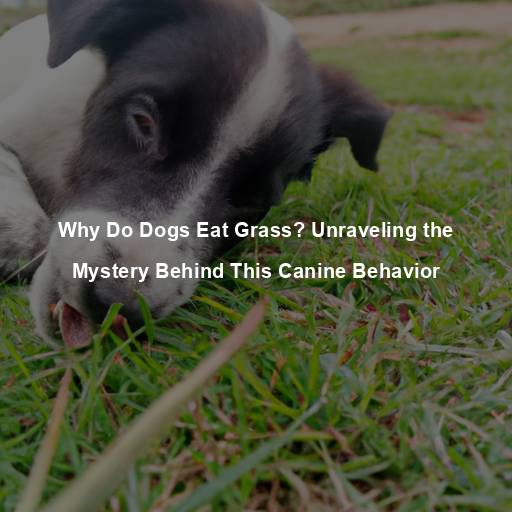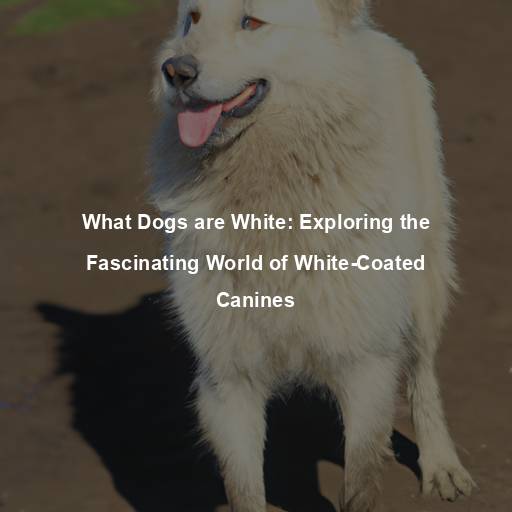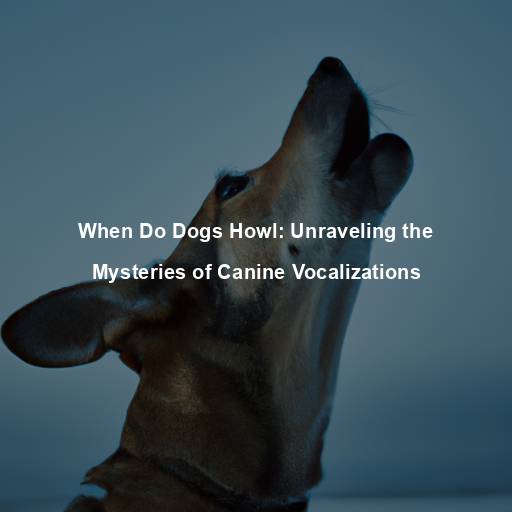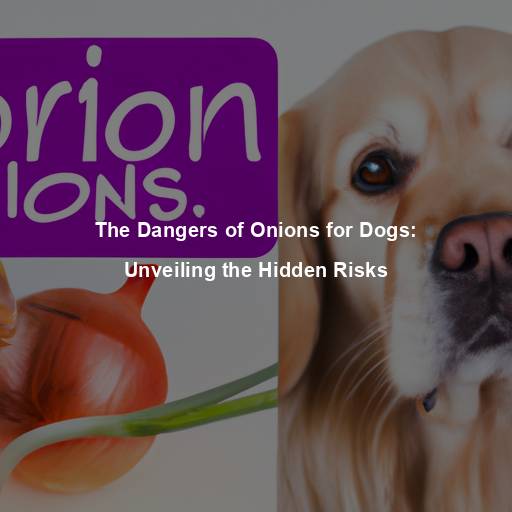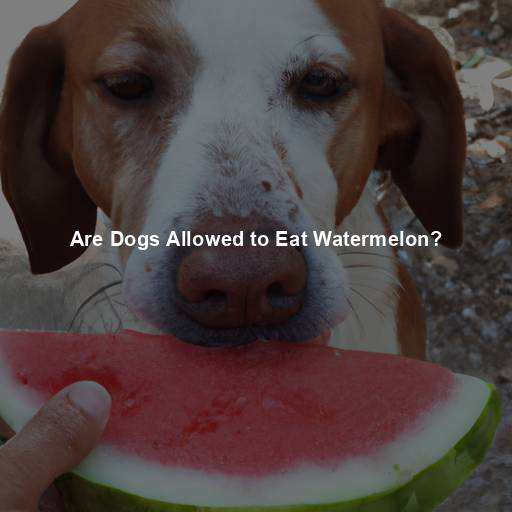Why Do Dogs Eat Grass? Unraveling the Mystery Behind This Canine Behavior
Last Updated on October 27, 2023 by Evan
Contents
- 1 The Curious Canine Diet: An Exploration of Dogs and Grass Consumption
- 1.1 Instinctual Behavior or Nutritional Deficiency?
- 1.2 The Medicinal Theory: Self-Medicating with Grass
- 1.3 Boredom, Anxiety, and Behavioral Causes
- 1.4 The Taste and Texture Appeal
- 1.5 Environmental Factors and Seasonal Allergies
- 1.6 The Importance of Observation and Veterinary Consultation
- 1.7 The Canine Ancestors: Wolves and Their Dietary Habits
- 1.8 The Role of Fiber in a Dog’s Diet
- 1.9 The Search for Nutritional Balance
- 1.10 Exploring the Palatability Factor
- 1.11 The Impact of Environmental Factors
- 1.12 Addressing Potential Health Concerns
- 1.13 Tips for Managing Grass-Eating Behavior
- 1.14 Seeking Professional Guidance
- 2 FAQs – Do Dogs Eat Grass to Vomit
The Curious Canine Diet: An Exploration of Dogs and Grass Consumption
As pet lovers, we’ve all witnessed it – our beloved four-legged companions munching on grass with an insatiable zeal. It’s a puzzling sight that never fails to leave us wondering about the motivation behind this peculiar behavior. Why do dogs indulge in this seemingly unconventional dining choice? Is it a mere quirk, or does it serve a deeper purpose?
Instinctual Behavior or Nutritional Deficiency?
The curious habit of dogs munching on grass has long puzzled pet owners everywhere. Many believe that this behavior is deeply rooted in their primal instincts inherited from their wild ancestors, the mighty wolves. It is said that wolves would often feast on the stomach contents of their prey, which included bits of plants. This practice was believed to aid in digestion, offer extra nourishment, and even assist in ridding the body of parasites.
There’s a swirling debate in the canine world about why dogs indulge in grass munching. Some enthusiasts argue that it could be due to a deficiency in their diet, as they’re on the hunt for specific nutrients that grass provides, like fiber or certain vitamins. However, it’s worth noting that most commercial dog foods are carefully crafted to meet a dog’s nutritional requirements, which casts doubt on this theory. So while the nutritional deficiency hypothesis holds some appeal, it’s just one piece of the puzzle, and the enigmatic nature of dogs and their grass-eating ways leaves us with more questions than answers.
The Medicinal Theory: Self-Medicating with Grass
Contrary to popular belief, dogs do not eat grass solely to induce vomiting. In fact, only a small percentage of dogs actually vomit after consuming grass. However, it is worth exploring the medicinal theory, which suggests that dogs may eat grass as a means of self-medication.
Grass contains certain enzymes and compounds that can have a soothing effect on a dog’s digestive system. If a dog is experiencing an upset stomach or gastrointestinal discomfort, they may instinctively turn to grass in an attempt to alleviate their symptoms. The rough texture of grass can help stimulate the dog’s gag reflex, aiding in the expulsion of any indigestible material or irritants from their stomach.
Boredom, Anxiety, and Behavioral Causes
Dogs, those delightful and social creatures, absolutely crave human interaction and mental stimulation. Yet, when devoid of these engaging experiences, they might find themselves venturing into a perplexing realm of behaviors to alleviate their overwhelming boredom or anxiety. And would you believe it, grass-eating happens to be one of those curious behaviors they engage in.
When it comes to our canine companions, some furry friends have a peculiar penchant for munching on a not-so-common snack—grass. Surprising as it may seem, for these dogs, chomping on blades of greenery becomes a compulsive act, much like our own nail-biting or pacing habits. This curious behavior often serves as an outlet for their pent-up energy or anxiety, giving them a sense of release. However, if you find your four-legged friend frequently treating themselves to a grassy buffet, it might be an indication that they long for more mental and physical stimulation in their daily routine.
The Taste and Texture Appeal
We can’t deny it – dogs possess this mysterious allure that drives them to unravel the wonders of our world with their inquisitive nature. Their taste buds, oh, how they captivate their furry senses, attracting them to the alluring taste and texture of grass. Some dogs, driven by curiosity, find themselves nibbling on this green foliage, diving headfirst into a sensory adventure that leaves us perplexed. And let’s not forget the undeniable satisfaction they derive from this oral exploration, reminiscent of the joy they find in chew toys or bones.
Environmental Factors and Seasonal Allergies
Dogs have a mysterious relationship with grass that can leave us scratching our heads. Surprisingly, environmental factors can come into play, shaping our furry friends’ grass-eating tendencies. Ponder this: suppose a dog encounters pesticides or unfamiliar chemicals on the grass, their instinctual response might be to cleanse their system by nibbling on the green blades. Additionally, dogs suffering from seasonal allergies might find solace in grass, using it as a peculiar method to ease their discomfort, akin to humans reaching for a tissue to tackle a pesky runny nose.
The Importance of Observation and Veterinary Consultation
The age-old mystery of why dogs indulge in grass consumption has stumped experts for years, leaving pet owners in a state of bewilderment. The truth is, the answer lies within the intricate web of individuality, as each dog unveils their own enigmatic reason for this peculiar behavior. Vigilance becomes paramount for those who share their lives with these furry companions, as they navigate the maze of patterns and behavioral shifts. Should the grass-eating extravaganza reach extravagant heights, accompanied by worrisome indicators such as projectile expulsion or anything out of the ordinary, seeking the sage advice of a veterinarian is highly recommended.
When it comes to your furry friend, seeking the expertise of a veterinary professional can be a wise choice. They possess the knowledge and skills to unravel the mysterious world of pet health, helping you navigate through the tangled web of potential medical conditions and nutritional conundrums. With their guidance, you’ll discover the bewildering intricacies of your dog’s behavior, and if needed, they’ll provide you with tailored solutions that will leave you feeling enlightened. Just remember, every pup is a captivating enigma, and what works for one might leave another scratching their head in bewilderment.
The Canine Ancestors: Wolves and Their Dietary Habits
Have you ever wondered why our furry friends, our beloved dogs, occasionally develop a sudden craving for grass? It’s a perplexing behavior that has puzzled pet owners for centuries. But fear not, because delving into the deep roots of canine evolution might just shed some light on this peculiar phenomenon. You see, dogs, with their ancestry intertwined with that of mighty wolves, have inherited a diverse diet that includes not only animal prey but also the occasional nibble of plants.
The Role of Fiber in a Dog’s Diet
When it comes to doggy diets, fiber is the unsung hero – a key player in keeping those furry friends feeling fab. Not only does it keep their tummies happy and healthy, but fiber also ensures regular potty breaks and helps keep those hunger pangs at bay. While fancy pet food brands may boast about their fiber content, some pups still find themselves drawn to that backyard grass buffet, instinctively seeking that extra fiber boost to keep things running smoothly. So, when Fido starts grazing away, know that they’re just tapping into nature’s way of getting their fiber fix, and it’s all for the love of digestive wellness.
The Search for Nutritional Balance
Dogs are known for their curious and exploratory nature. In their quest for nutritional balance, they may instinctively seek out different food sources, including grass. Grass contains a variety of nutrients, such as vitamins and minerals, that can contribute to a dog’s overall well-being. While dogs may not consciously understand the nutritional benefits of grass, their innate drive to seek out different food sources may lead them to consume it.
Exploring the Palatability Factor
Dogs and grass – an unlikely connection that perplexes and bursts with intrigue. Who would have thought that the taste and texture of grass could hold such fascination for our furry friends? It seems that the freshness and crispness of those humble blades can provide an unexpected sensory delight, evoking a sense of joy akin to chewing on their favorite toys or bones. And let us not forget the wild instincts that come into play – as dogs graze on grass, they tap into their primal foraging tendencies, mirroring the behaviors of their untamed brethren.
The Impact of Environmental Factors
Grass, oh the enigmatic allure it holds for our canine companions! It seems that spending ample time outside, frolicking in lush green expanses, may fuel a dog’s penchant for nibbling on nature’s carpet. Yet, the reasons behind this curious inclination are as multifaceted as a meadow in bloom. From the tantalizing scent symphony that surrounds them to the tantalizing taste tease grass offers, our four-legged friends can’t resist the alluring call of the green blades.
Addressing Potential Health Concerns
While grass consumption is generally considered harmless for dogs, there are a few factors to keep in mind. Firstly, it is crucial to ensure that the grass your dog has access to is free from pesticides, fertilizers, or any potentially harmful chemicals. Additionally, certain grasses and plants can be toxic to dogs, so it is essential to familiarize yourself with the vegetation in your surroundings and prevent your dog from ingesting anything that could pose a risk to their health.
Tips for Managing Grass-Eating Behavior
If your dog has a tendency to consume grass, there are a few steps you can take to manage this behavior:
Give your furry companion a well-rounded and wholesome diet that caters to their individual needs. Seek guidance from a trusted veterinarian to determine the optimal nutrition for your dog, taking into account factors such as their age, breed, and overall health. Create a menu that balances essential nutrients and fulfills their dietary requirements, ensuring a healthy and vibrant life for your beloved pet.
If you suspect that your furry companion’s peculiar habit of munching on grass is due to a fiber deficiency, fret not! Seek the guidance of a trusted veterinarian who can assist you in adding fiber-rich foods to your pooch’s menu. By incorporating these nutrient-packed options, you can provide your four-legged friend with the necessary sustenance, sans the grass-munching shenanigans.
-
Environmental Management: If your dog’s grass-eating behavior is excessive or causing concerns, consider creating an environment that discourages access to grass. This can be achieved by using fencing, creating designated play areas, or utilizing alternative ground coverings in your yard.
-
Mental Stimulation and Exercise: Ensure that your dog receives an adequate amount of mental and physical exercise. Engage them in interactive play, provide puzzle toys, and take them for regular walks or playdates to keep them mentally stimulated and reduce the likelihood of engaging in grass-eating behavior out of boredom.
Seeking Professional Guidance
If your dog’s grass-eating behavior is excessive, persistent, or accompanied by other concerning symptoms, it is advisable to seek professional guidance from a veterinarian or a certified animal behaviorist. They can assess your dog’s specific situation, rule out any underlying medical conditions, and provide tailored advice to address the behavior effectively.
FAQs – Do Dogs Eat Grass to Vomit
Why do dogs eat grass?
Dogs and their curious behaviors, ah, where do we even begin? One fascinating aspect that has perplexed owners for ages is their affinity for feasting on grass. It’s a burst of bewilderment, really. Some pooches seem to savor the mere taste and texture of the green goodness, while others might trace their primal instincts back to their omnivorous lineage. But here comes the plot twist: experts speculate that our furry friends might actually munch on grass to provoke a rather unexpected outcome – yes, you guessed it – vomiting! A curious case of canine cleansings, one might say.
Do dogs eat grass to vomit?
It’s true that grass-eating among dogs can occasionally lead to vomiting, but it’s a curious behavior that not all dogs engage in. Recent studies have revealed that only a fraction of canines showcase this particular quirk. While it’s theorized that munching on grass may irritate their stomach linings, it’s worth noting that many dogs chomp down on grass without any vomit-related motives whatsoever. The perplexing aspects of this grass-eating phenomenon continue to baffle experts.
Is it safe for dogs to eat grass?
In most cases, it is generally safe for dogs to eat grass. However, it is crucial to ensure that the grass has not been treated with any pesticides, herbicides, or other chemicals that can be harmful to dogs. It is also essential to examine the grass for any potential hazards like sharp objects, toxic plants, or parasites. Additionally, excessive consumption of grass can lead to digestive issues or obstructions, so it’s important to monitor your dog’s grass-eating habits and consult a veterinarian if you have any concerns.
Should I be worried if my dog eats grass?
It’s not uncommon for our furry companions to nibble on the occasional blade of grass, but when it becomes a habitual feast, it’s natural for perplexity to creep in. While a casual munch now and then usually raises no eyebrows, it’s a different story when our four-legged friends turn into grass-consuming enthusiasts. Excessive grass gourmandizing paired with distress signals like tummy turmoil or vomit sessions should prick up the ears of concerned pet parents. And if you suspect those botanical bites have been infused with not-so-natural chemicals, a consultation with a trusted veterinarian becomes an imperative compass guiding your dog’s well-being through the verdant maze of ambiguity.
Are there any alternative explanations for dogs eating grass?
Have you ever wondered why dogs chomp on grass? While one popular belief is that they do it to induce vomiting, there could be other reasons at play. It turns out that dietary deficiencies, boredom, anxiety, or even seeking attention might be behind this perplexing behavior. So, before jumping to conclusions, it’s essential to delve deeper into your furry friend’s overall behavior and well-being.
How can I prevent my dog from eating grass?
If you are concerned about your dog’s grass-eating behavior, there are a few steps you can take to try and prevent it. Ensuring that your dog has a balanced and nutritious diet can help address any potential dietary deficiencies. Providing mental and physical stimulation through regular exercise and play can help alleviate boredom that may lead to grass-eating. Additionally, training your dog to have a strong “leave it” or “drop it” command can discourage them from consuming grass when it’s not desired. Consulting with a professional dog trainer or veterinarian can also provide valuable insights and guidance on addressing this behavior.

